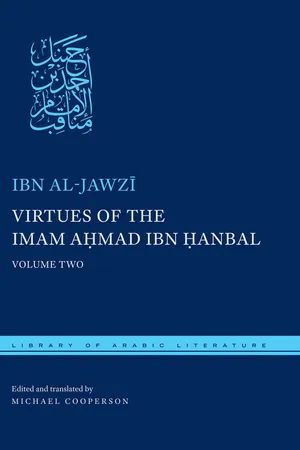الباب الحادي والخمسون
في ذكر حبه للفقر والفقراء
Chapter 51
His Love of Poverty and His Affection for the Poor
أخبرنا محمّد بن أبي منصور قال: أخبرنا عبد القادر بن محمّد قال: أنبأنا إبراهيم بن عُمر قال: أنبأنا عبد العزيز بن جعفر قال: أخبرنا أحمد بن محمّد الخلّال قال:
أخبرني محمّد بن الحسين أن أبا بكر المَرُّوذي حدثهم قال: كان أبو عبد الله يحب الفقراء لم أرَ الفقير في مجلسِ أحدٍ أعزّ منه في مجلسه.
We cite Muḥammad ibn Abī Manṣūr, who cites ʿAbd al-Qādir ibn Muḥammad, who was informed by Ibrāhīm ibn ʿUmar, who was informed by ʿAbd al-ʿAzīz ibn Jaʿfar, who cites Aḥmad ibn Muḥammad al-Khallāl, who cites Muḥammad ibn al-Ḥusayn, who heard Abū Bakr al-Marrūdhī report:
[Al-Marrūdhī:] Aḥmad loved the poor. I never saw poor men treated as well as they were when sitting in his company.
قال الخلّال:
وأخبرنا أبو بكر المَرُّوذي قال: قال لي أبو عبد الله – وذكر رجلاً فقيرًا مريضًا – فقال لي: اذهب إليه وقُل١: أيّ شيء تشتهي حتى نعمل لك؟ ودفع إليَّ طِيبًا وقال لي: طَيِّبه.
Al-Khallāl cites Abū Bakr al-Marrūdhī, who reports:
[Al-Marrūdhī:] Aḥmad once mentioned someone who was poor and ill, and told me, “Go and ask him what he wants us to do for him.”
Then he handed me some scent and said, “Put this on him.”
أخبرنا محمّد بن أبي منصور قال: أخبرنا المبارك بن عبد الجبار قال: أخبرنا أبو بكر محمّد بن عليّ الخياط قال: أنبأنا ابن أبي الفوارس قال: أخبرنا أحمد بن جعفر بن سَلْم قال: حدثنا أحمد بن محمّد بن عبد الخالق قال:
أخبرنا أبو بكر المرُّوذي قال: قال أبو عبد الله أحمد بن حنبل: ما أعدِلُ بالفَقر شيئًا، ما أعدل بالفقر شيئًا، ما أعدل بالفقر شيئًا،١ أنا أفرح إذا لم يكن عندي شيء.
وذكرتُ له رجلاً صَبورًا على الفقر في أطمار فكان يسألني عنه ويقول: اذهب حتى تأتيني٢ بخبره، سبحان الله، الصبر على الفقر، الصبر على الفقر، ما أَعدِل بالصبر على الفقر شيئًا، تَدري الصبر على الفقر أيّ شيء هو؟ وقال: كم بين من يُعطَى من الدنيا ليفتتن إلى آخر تزوي عنه.
وذكرتُ لأبي عبد الله الفُضيل وعُرْيَه وفَتحًا الموصلي وعريه٣ وصبره فتغَرْغرت عينه وقال: رحِمهم الله، كان يُقال: عند ذكر الصالحين تنزل الرحمة.
وقال لي أبو عبد الله يومًا: إني لأفرح إذا لم يكن عندي شيء. فجاءه ابنه الصغير بعَقب هذا الكلام فطلب منه فقال: ليس عند أبيك قطعة ولا عندي شيء.
We cite Muḥammad ibn Abī Manṣūr, who cites al-Mubārak ibn ʿAbd al-Jabbār, who cites Abū Bakr Muḥammad ibn ʿAlī l-Khayyāṭ, who was informed by Ibn Abī l-Fawāris, who cites Aḥmad ibn Jaʿfar ibn Salm, who heard Aḥmad ibn Muḥammad ibn ʿAbd al-Khāliq report that he heard Abū Bakr al-Marrūdhī report:
[Al-Marrūdhī:] Aḥmad ibn Ḥanbal once said, “Nothing does as much good as poverty—nothing! When there’s no money here I rejoice.”
I once mentioned someone who bore poverty steadfastly despite living in rags. After that he would ask me about him, saying, “Go and see how he’s doing! God be praised: there’s nothing like bearing poverty—nothing like it at all. Do you understand what it means?”
Once he said, “Some people have the things of this world given to them in order to test them. It’s much better when the world leaves you alone!”
I once mentioned how al-Fuḍayl and Fatḥ al-Mawṣilī had lived in destitution but bore up without complaint. “God have mercy on them,” he said, as his eyes filled with tears. “They used to say that when the righteous are recalled, God’s grace descends.”
One day he said, “When there’s no money here, I’m glad.”
No sooner had he said it than his little son came to ask him for something. “Your father doesn’t have a single coin,” he replied, “or anything else.”






